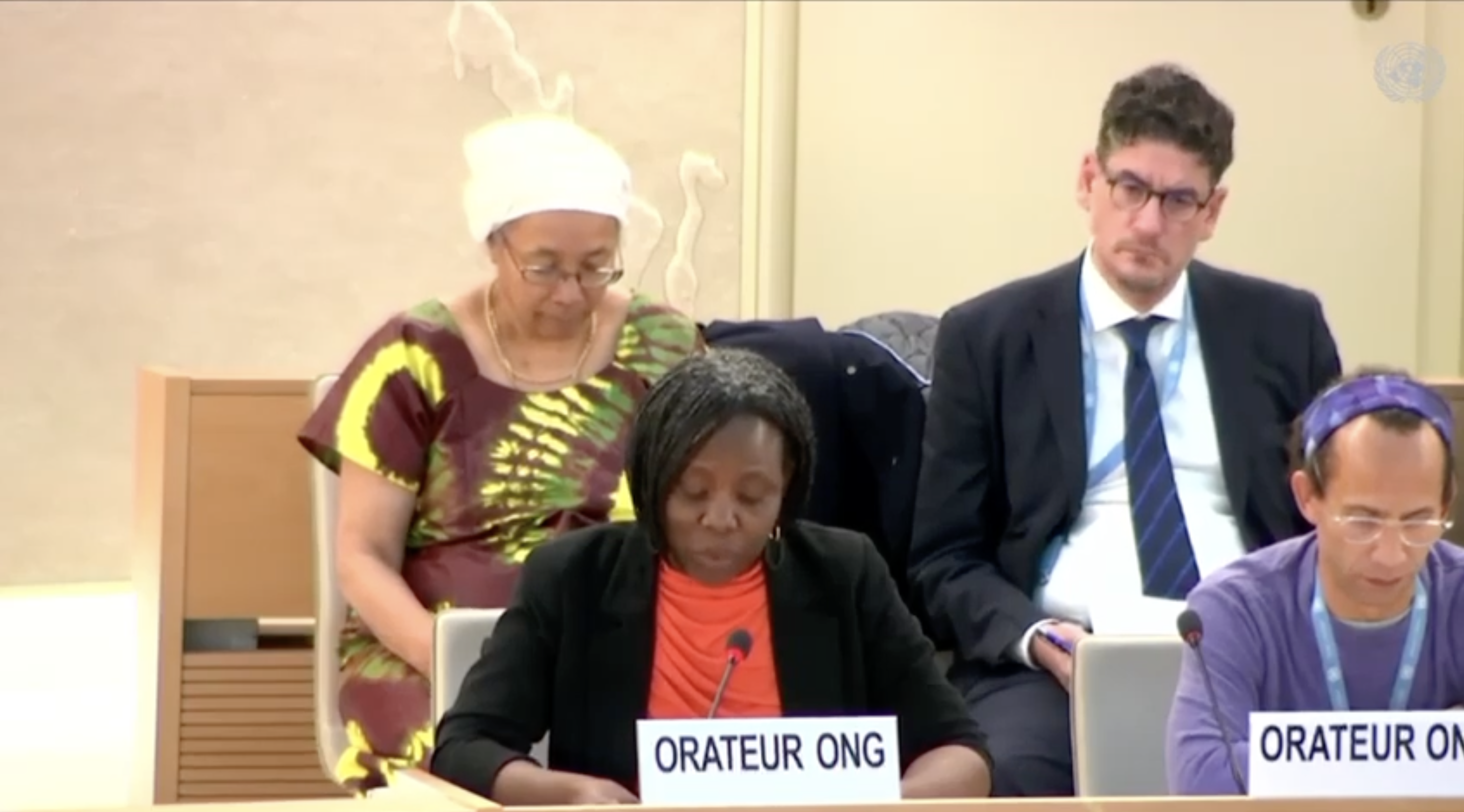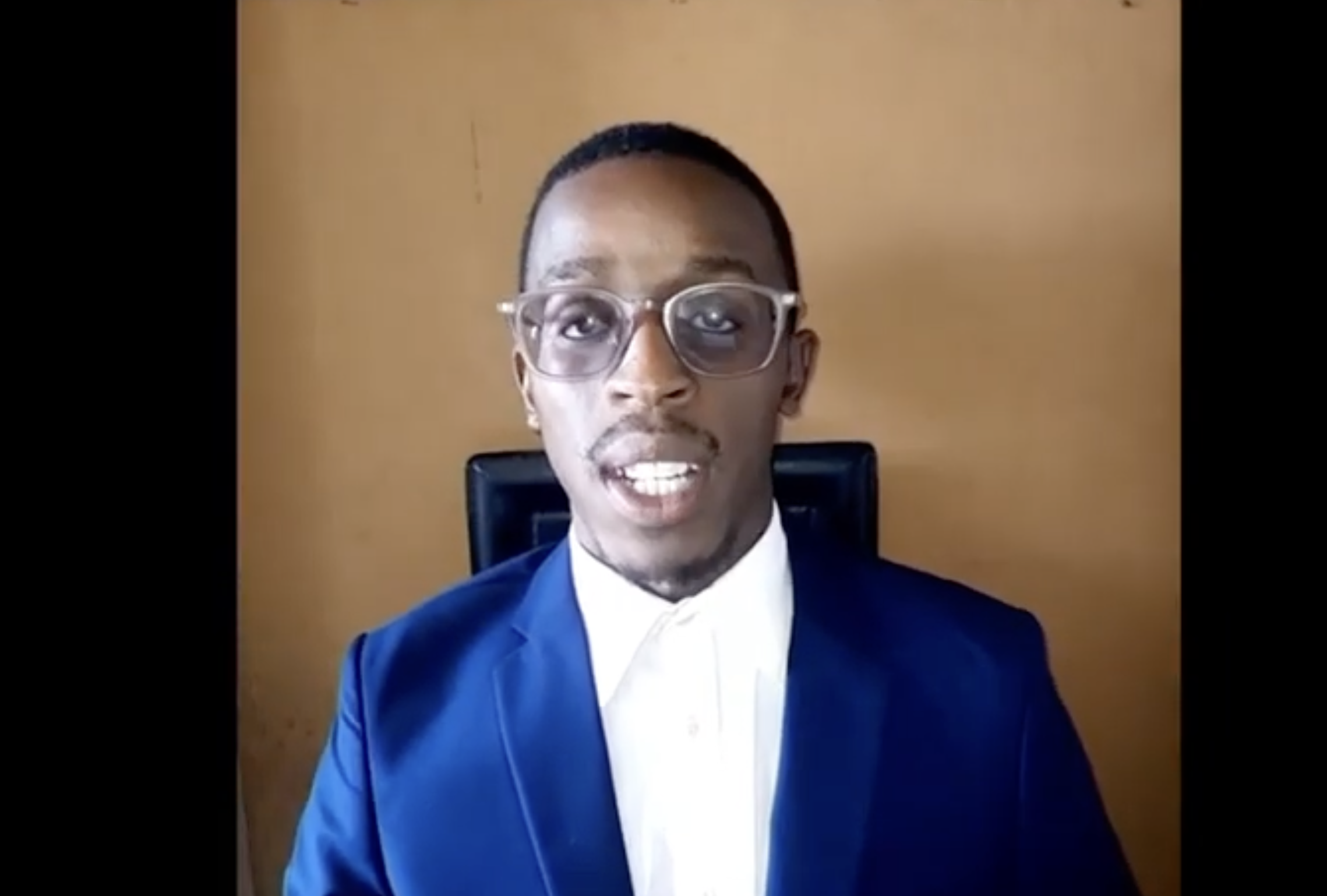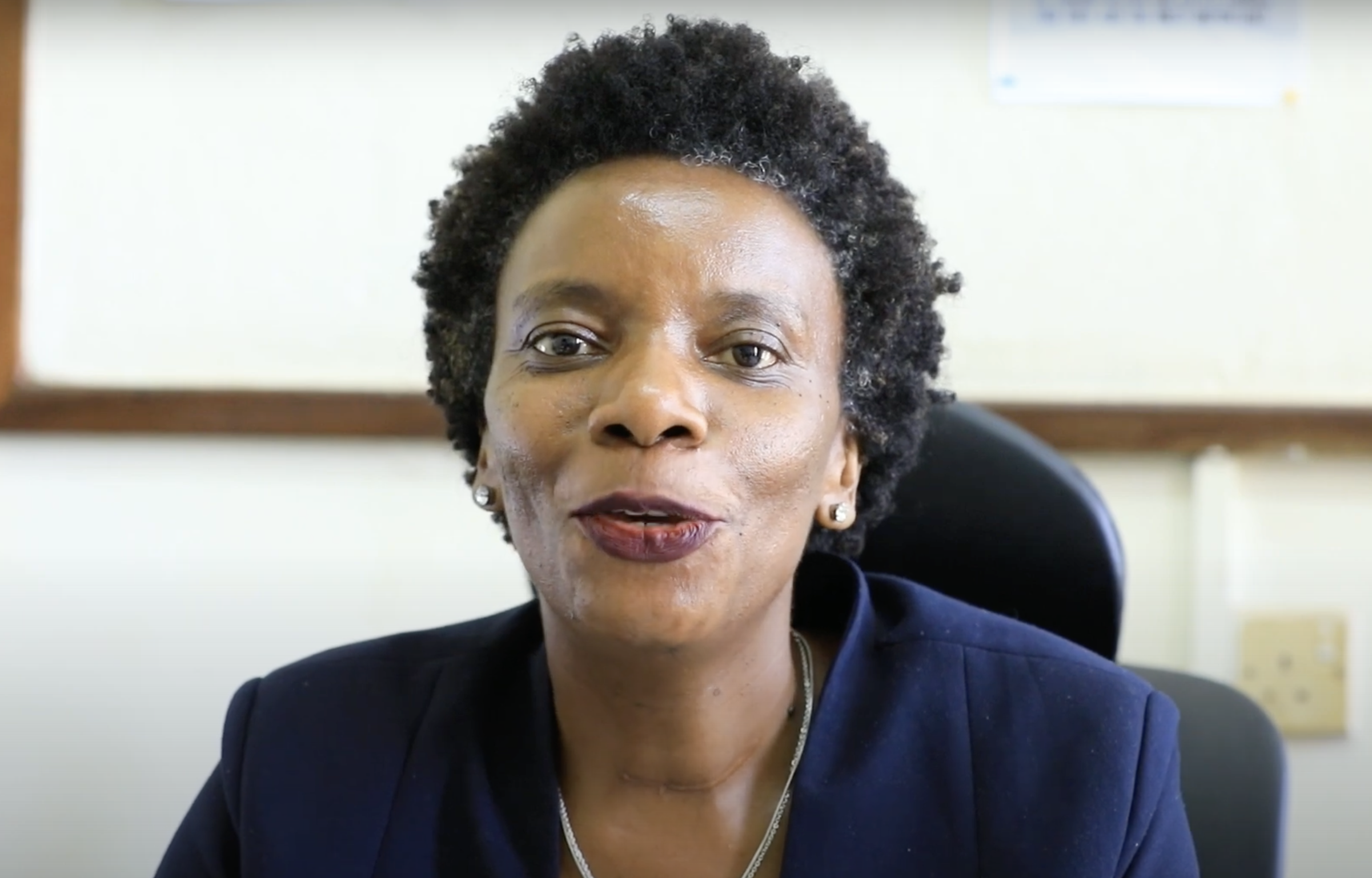HRC55: Myanmar's military rule: the ongoing oppression of Rohingya and Human Rights violations
The 55th Session of the Human Rights Council
26 February – 5 April 2024
Item 4: Interactive dialogue with the Special Rapporteur on the situation of Human rights in Myanmar, Thomas Andrews
19th March 2024
By Inès Najeh / GICJ
On 19 March 2024, the 55th Session of the Human Rights Council convened during an interactive dialogue to consider the Special Rapporteur’s report on the human rights situation in Myanmar (A/HRC/55/65). The Special rapporteur opened the dialogue by presenting the findings of his latest report focusing on human rights violations since the Coup d’état of 2021 by the military regime (junta).
He depicted the harsh reality of civilian suffering daily to ensure that all States fully understood and appropriately responded to these violations. These violations include forced displacement, obstruction of humanitarian aid, and severe systemic violence against ethnic communities like the Rohingya, perpetrated by the Myanmar military Junta.
In his report, the Special Rapporteur emphasised the need for Member States to enhance their collective efforts in undermining a weakened junta by cutting off its access to weapons, finances, and legitimacy. The report called for measures to hold perpetrators of heinous crimes accountable and backed initiatives led by key figures aimed at establishing a just, peaceful, and democratic Myanmar. Donors and humanitarian organisations must ensure that desperately needed humanitarian aid reaches those with the greatest needs in conflict areas, including displaced populations.
Regarding the report on the situation in Myanmar, various delegations expressed deep concern towards the multiple violations of international humanitarian law, especially concerning airstrikes on the civilian population, the growing number of displaced people and the forced recruitment in the military.
The non-governmental organisations (NGOs) applauded the unwavering determination of the people of Myanmar to be free from the military regime and build a new democracy, allowing justice and human rights. The unanimity of organisations welcomed the Special Rapporteur’s report, emphasising the horror the people of Myanmar and the Rohingyas are currently living in. Numerous organisations called for action from the international community, including cutting off financial support for the junta’s repression. A common plea was for the international community to take effective measures to put an end to the human rights violations being committed against the entire population of Myanmar, particularly the Rohingya.
Geneva International Centre for Justice (GICJ) welcomes the Special Rapporteur’s report on the situation of human rights in Myanmar and stands behind the recommendations made in his report, urging the international community to address the human rights violations perpetrated by the junta against civilians and the Rohingya population.
Background
Following Myanmar's independence in January 1948, the country underwent long internal struggles and a succession of dictatorial regimes. While the country struggled to move towards a more democratic regime, a Coup d'Etat against the democratic government took place in February 2021, wiping out all traces of hope for the future.
Since 2021, Myanmar has struggled with a harsh reality marked by violence, terror and ethnic cleansing. The arrival of the military junta or State Administration Council (SAC) has resulted in flagrant and critical human rights violations, including arbitrary arrests, violence against civilians, suppression of pro-democracy protests and the prevention of public opposition with internet shutdowns, etc.
The political turmoil has exacerbated existing economic hardships, with soaring inflation, widespread poverty, unemployment, etc. Additionally, ethnic conflicts in various regions have continued to destabilise communities, leading to displacement and further humanitarian crises. Indeed, due to the multiplicity of ethnicities within the country, minorities constantly face hardship. This is notable in the case of the Rohingyas, a Muslim community that has been targeted and persecuted for decades by the changing governments and now by the military junta.
The Rohingyas have endured almost seven decades of statelessness in their own country, witnessed the dismantling of their economic livelihood and faced restrictions on marriage and childbearing. The Human Rights Council (HRC) has already expressed its concern notably in the 2020 annual report of the High Commissioner for Human Rights (A/HRC/45/5), where evidence shows that the situation against the Rohingyas may constitute crimes against humanity. However, the Muslim community is not the only one targeted by the military junta, as dozens of churches are destroyed, villages are burned, and Christian civilians are murdered.
The international community has not been entirely silent regarding the major violations of human rights that amount to crimes against humanity and even genocide. Indeed, diplomatic efforts have been mainly through the ASEAN five-point consensus adopted in April 2021 in response to the military coup. This strategy aims to address the situation in Myanmar by calling for an immediate cessation of violence, constructive dialogue among all parties, and appointing a special envoy from ASEAN to facilitate mediation efforts. Additionally, it urges the delivery of humanitarian assistance through ASEAN channels and the promotion of a visit by the special envoy to Myanmar.
The Special Rapporteur's mandate on human rights in Myanmar was established in 1992 by the Commission on Human Rights resolution 58 and is renewed annually. Since 2020, the Special Rapporteur on the issue, Tom Andrews, has been concerned over the dire situation in Myanmar and urged the international community to act and help the people of Myanmar as they strive for freedom and stability. In his latest report (A/HRC/55/65), he noted that more than 2.7 million people are now displaced and 18.6 million people are in urgent need of humanitarian aid, before the coup, the number amounted to one million.
Report of the Special Rapporteur on the Situation of Human Rights in Myanmar
It has been three years since the military coup in Myanmar by the State Administration Council (SAC), which is now facing difficulties. Due to offensive attacks from opposition groups, the military force has started to weaken and lose territory and personnel. The Special Rapporteur noted in his report the “courage, resolve and defiance” of the people of Myanmar is allowing the resistance forces to gain ground against the junta forces. However, these small victories are not enough to stop the violent rampage of the SAC.
The report noted that the SAC is using its robust supply of sophisticated weapons of war to double down on its attacks on civilians, non-combatants and civilian infrastructures during ground operations and airstrikes. The report also noted that in January 2024, planes allegedly bombed Kanan, a village in the Sagaing region, resulting in the deaths of 17 people, including eight children. Despite the SAC's denial, evidence suggests the attack was carried out using Chinese-manufactured attack jets commonly used by the Myanmar military.
Moreover, the Special Rapporteur highlighted the important impact of the conflict on increasing sexual violence. The conflict-related sexual violence by SAC forces are exacerbated by displacement, security risks, and social stigmas. Cruelty and dehumanisation characterise junta’s perpetrated sexual violence, including gang rape, the rape of pregnant women, and children. Victims are sometimes killed post-assault, with multiple accounts of victims being burned alive.
The Special Rapporteur continued his report by noting the junta’s enforcement of the 2010 People's Military Service Law leading to widespread forced recruitments and conscription, triggering a surge in visa applications and youth seeking alternative routes out of Myanmar. Forced recruitment extends to Rohingya populations in the Rakhine State, with reports of hundreds undergoing military training under threats and coercion.
This escalation of violence caused a large number of people to be displaced, accounting for nearly 800,000 people since late October 2023. The report noted an important humanitarian crisis such as the growing food crisis in areas such as the Kayah State or the Sagaing Region, where intense conflict has persisted for months or even years, depleting essential food stores and community resources.
Furthermore, the report provided insight into the Rogyingas community in Myanmar and bordering nations. Indeed, the community continues to face oppression, violence and danger under the SAC regime. The Rohingya are denied any access to livelihood, education, and healthcare, especially for women and girls who remain isolated and suffer from discrimination from both the regime and their community. The report stated that this population survives in an apartheid regime enforced by the junta, marked by the systematic denial of citizenship, severe movement restrictions, and limited access to essential services.
Moreover, the report noted that the conflict has hindered the distribution of humanitarian assistance to the population in the Rakhine State. According to certain humanitarian groups, the SAC has not approved travel authorisations for operating in the Rakhine State since late 2023. Thus, the conflict has increased the number of forced displacements of the Rohingya population into Bangladesh. The Special Rapporteur added that while Bangladesh has opened its borders to those fleeing violence and oppression in Myanmar since 2017, the country is no longer allowing full integration, forcing the Rohingya to be completely dependent on international assistance. Accessing humanitarian aid poses a mountainous challenge for a rising number of individuals in need, especially those residing in conflict zones. People with disabilities encounter specific hurdles in accessing such assistance. Factors like security threats, communication limitations, and physical barriers frequently impede their ability to access aid services.
The intensifying conflict exacerbates the soaring demand for humanitarian aid. Individuals residing in conflict-affected regions are disproportionately underserved, worsening an already dire situation for millions. However, the report notes that the United Nations funding availability has significantly decreased, resulting in a 68% shortfall in 2023. As humanitarian aid requirements are expected to surpass funding capacities, it is crucial to allocate funds strategically to prioritise those with the most pressing needs. Enhancing efficiency entails channelling more assistance to local civil society organisations operating in conflict zones.
Finally, the Special Rapporteur concluded his report with recommendations to end the conflict in Myanmar and allow respect for human rights for all. He urged Member States, the United Nations and international humanitarian organisations to “Recognise the National Unity Government as the legitimate representative of the people of Myanmar” and hold the military accountable for international crimes, notably by referring the situation to the prosecutor of the ICC. Finally, he emphasised acting to isolate the SAC by putting sanctions on weapons and financial transfers used for attacks. Among its recommendations, the Special Rapporteur called on ASEAN and its Member States to involve the National Unity Government as representing the desires and welfare of the people of Myanmar and enable the provision of humanitarian aid to all affected populations by endorsing cross-border humanitarian initiatives carried out by local civil society groups.
Interactive Dialogue
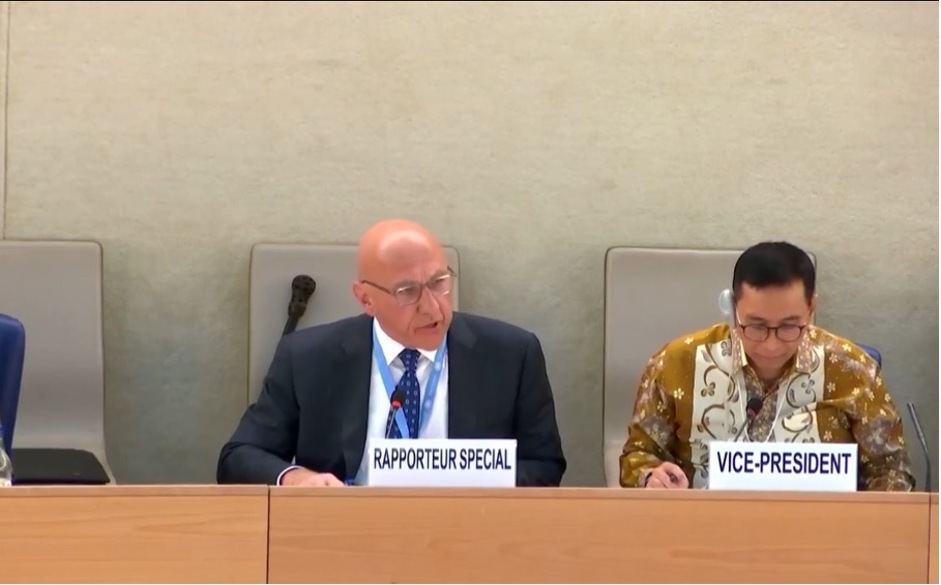 The Special Rapporteur (SR) on the situation of human rights in Myanmar expressed deep concern for the situation and implored the international community, including the Security Council, to direct its attention to the crisis. He noted some good news, qualifying them as a “turning tide”. Indeed, the widespread citizens’ opposition to the junta and mounting battlefield victories by resistance forces caused the military to lose territories and troops. However, the situation is far from resolved, and the junta remains very dangerous as they continue targeting civilians with powerful weapons of war obtained abroad, causing a fivefold increase in airstrikes during the past five months. He noted that the Rohingya community, in particular, faces severe hardship, enduring ongoing bombardment by junta forces while being denied the opportunity to seek safety elsewhere.
The Special Rapporteur (SR) on the situation of human rights in Myanmar expressed deep concern for the situation and implored the international community, including the Security Council, to direct its attention to the crisis. He noted some good news, qualifying them as a “turning tide”. Indeed, the widespread citizens’ opposition to the junta and mounting battlefield victories by resistance forces caused the military to lose territories and troops. However, the situation is far from resolved, and the junta remains very dangerous as they continue targeting civilians with powerful weapons of war obtained abroad, causing a fivefold increase in airstrikes during the past five months. He noted that the Rohingya community, in particular, faces severe hardship, enduring ongoing bombardment by junta forces while being denied the opportunity to seek safety elsewhere.
Furthermore, in his latest report, A/HRC/55/65, the Special Rapporteur highlighted that the junta has commenced a forced military recruitment program, sometimes resorting to street abductions of young men. This coercion has compelled many youths to flee the country or join resistance forces, unwilling to be drafted into the junta's brutality. He applauded the government of Singapore, where entities transferred weapons to Myanmar, for launching an investigation regarding these transfers, which allowed an 83% drop in Singapore-based entities in 2023. However, he underscored the insufficiency of the international community’s response and believes that for engagement to succeed, it is imperative to honour the first point of the ASEAN’s 5-Point consensus, which is stopping the violence.
Finally, he urged for an immediate coalition of States to build, coordinate, and target sanctions against the junta and to protect the people of Myanmar. In order to do so, the Special Rapporteur highlighted the significant steps for the people of Myanmar: the first step is “A humanitarian aid strategy that gets desperately needed aid quickly and efficiently to those who are in the greatest need”; the second step is “Ending impunity for war crimes and crimes against humanity” notably by refer the situation to the International Criminal Court under Article 14 of the Rome status. The final step should be done by “investing now in preparations for Myanmar’s transition”.
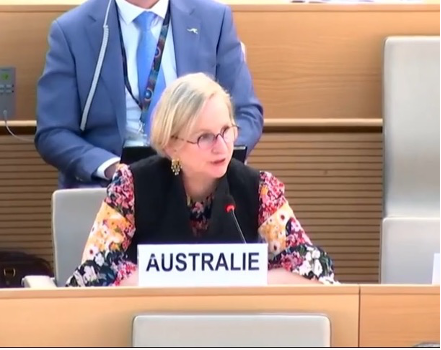 The delegate of Australia, who spoke on behalf of Canada and New Zealand, expressed deep concern regarding the violence against civilians, the violations of international humanitarian law and the growing number of displaced people. They reiterated their strong support for ASEAN in resolving the crisis and called on the United Nations and the international community to support efforts to press the regime to cease the violence and release unjustly detained people. They noted the importance of meaningful dialogue, full access to humanitarian assistance and the effective implementation of the Five-Point Consensus.
The delegate of Australia, who spoke on behalf of Canada and New Zealand, expressed deep concern regarding the violence against civilians, the violations of international humanitarian law and the growing number of displaced people. They reiterated their strong support for ASEAN in resolving the crisis and called on the United Nations and the international community to support efforts to press the regime to cease the violence and release unjustly detained people. They noted the importance of meaningful dialogue, full access to humanitarian assistance and the effective implementation of the Five-Point Consensus.
The delegation of Pakistan, representing the OIC was 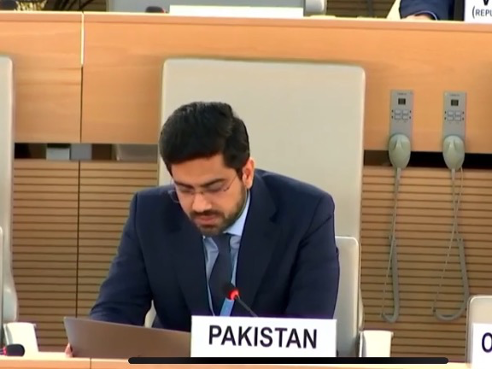 alarmed at the forced recruitments in the military and the use of Rohingyas as human shields. Moreover, they expressed concern about the decreasing global attention to the humanitarian needs of the Rohingyas people in Myanmar. They urged the international community to continue supporting the safety and dignity of the minority and to facilitate their right to return to their homeland in Rakhine State. Additionally, the OIC emphasised the importance of accountability, justice, and finding a lasting solution to the crisis. The delegate of Pakistan called upon the High Commissioner for Human Rights to actively engage in seeking a sustainable resolution, including by participating in efforts to ensure accountability
alarmed at the forced recruitments in the military and the use of Rohingyas as human shields. Moreover, they expressed concern about the decreasing global attention to the humanitarian needs of the Rohingyas people in Myanmar. They urged the international community to continue supporting the safety and dignity of the minority and to facilitate their right to return to their homeland in Rakhine State. Additionally, the OIC emphasised the importance of accountability, justice, and finding a lasting solution to the crisis. The delegate of Pakistan called upon the High Commissioner for Human Rights to actively engage in seeking a sustainable resolution, including by participating in efforts to ensure accountability
The delegation of Sweden on behalf of the Nordic-Baltic countries, strongly condemned the military's violent actions and urged the regime to cease all forms of violence against civilians, inc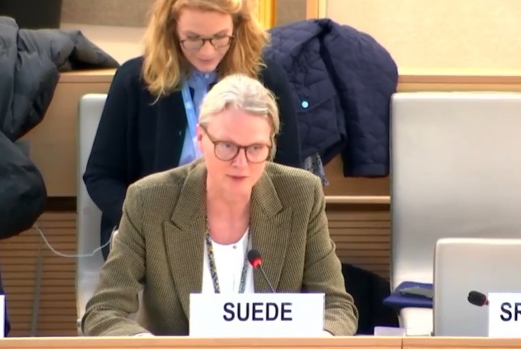 luding sexual and gender-based violence, aerial assaults, mass atrocities, and persecution. Upholding international law is imperative for all parties involved in the conflict. They expressed deep concern over the imposition of mandatory military service at the risk of an already delicate situation and an infringement upon human rights. The Nordic-Baltic countries stressed the urgent need to deliver humanitarian aid to those in distress while also backing entities committed to fostering a democratic transition that upholds human rights, transparency, and accountability.
luding sexual and gender-based violence, aerial assaults, mass atrocities, and persecution. Upholding international law is imperative for all parties involved in the conflict. They expressed deep concern over the imposition of mandatory military service at the risk of an already delicate situation and an infringement upon human rights. The Nordic-Baltic countries stressed the urgent need to deliver humanitarian aid to those in distress while also backing entities committed to fostering a democratic transition that upholds human rights, transparency, and accountability.
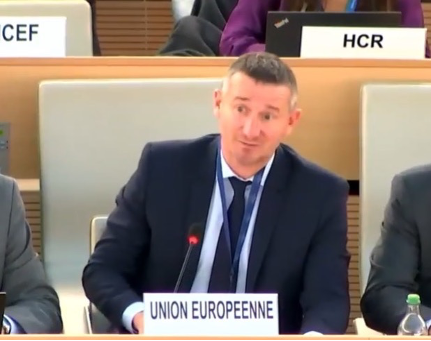 The European Union condemned all humanitarian access restrictions and encouraged the UN to take a more active role in humanitarian aid. The EU expressed concern about the Myanmar military's announcement of mandatory conscription, which risks exacerbating instability in Myanmar and the surrounding region. The EU has long advocated for an arms embargo and stressed the urgent need for increased international preventive measures. They called to cease the export or facilitation of weapons to the Myanmar military, including "dual-use" items, if there are reasonable suspicions of human rights violations.
The European Union condemned all humanitarian access restrictions and encouraged the UN to take a more active role in humanitarian aid. The EU expressed concern about the Myanmar military's announcement of mandatory conscription, which risks exacerbating instability in Myanmar and the surrounding region. The EU has long advocated for an arms embargo and stressed the urgent need for increased international preventive measures. They called to cease the export or facilitation of weapons to the Myanmar military, including "dual-use" items, if there are reasonable suspicions of human rights violations.
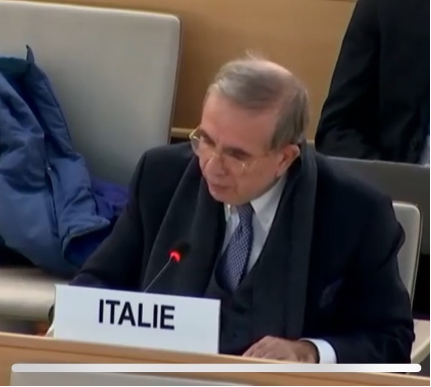 The delegation of Italy stated its concern regarding the violence and the dire political, human rights and humanitarian crisis in Myanmar. They urged for the end of systematic discrimination against the Rohingya and other religious and ethnic minorities, for the military regime to apply the “five-point consensus” and ensure unobstructed humanitarian access. Italy encouraged the efforts of ASEAN in addressing the crisis. Finally, they emphasised the importance of promptly appointing a UN Special envoy and a resident coordinator.
The delegation of Italy stated its concern regarding the violence and the dire political, human rights and humanitarian crisis in Myanmar. They urged for the end of systematic discrimination against the Rohingya and other religious and ethnic minorities, for the military regime to apply the “five-point consensus” and ensure unobstructed humanitarian access. Italy encouraged the efforts of ASEAN in addressing the crisis. Finally, they emphasised the importance of promptly appointing a UN Special envoy and a resident coordinator.
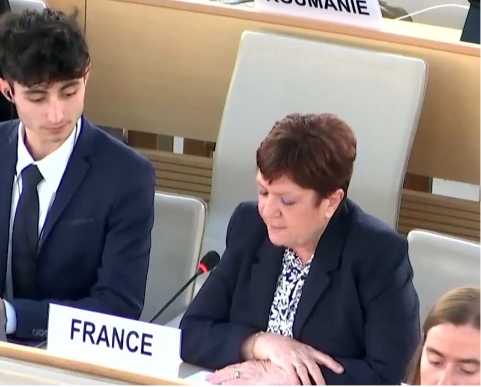 The French delegation deplored the lack of will to change Myanmar's military regime despite ASEAN's efforts to promote political discussion. France called for the discontinuation of violence against the Myanmar population by guaranteeing full, safe and unhindered humanitarian access. It reiterated its commitment to establishing a political dialogue in good faith, including the democratic opposition, which is an indispensable condition and a first step in any solution to end the crisis.
The French delegation deplored the lack of will to change Myanmar's military regime despite ASEAN's efforts to promote political discussion. France called for the discontinuation of violence against the Myanmar population by guaranteeing full, safe and unhindered humanitarian access. It reiterated its commitment to establishing a political dialogue in good faith, including the democratic opposition, which is an indispensable condition and a first step in any solution to end the crisis.
The deleg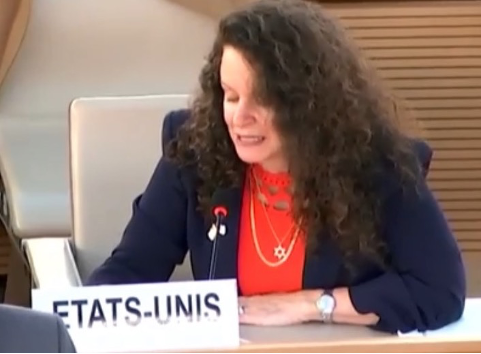 ation of the United States of America called on the international community to seek an end to violence and to find a peaceful resolution to this crisis. They considered that this could be achieved by impeding the military access to arms, including aviation fuel and financial resources, especially if the Security Council was to restrict the flow of arms. It is imperative to provide humanitarian aid to Rohingyas and other communities in need in Myanmar and Bangladesh.
ation of the United States of America called on the international community to seek an end to violence and to find a peaceful resolution to this crisis. They considered that this could be achieved by impeding the military access to arms, including aviation fuel and financial resources, especially if the Security Council was to restrict the flow of arms. It is imperative to provide humanitarian aid to Rohingyas and other communities in need in Myanmar and Bangladesh.
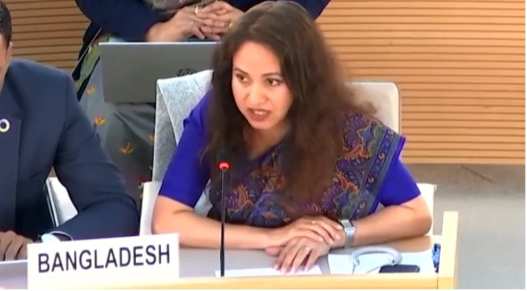 The delegation of Bangladesh was preoccupied with the number of deaths and the explosion of attacks on Bangladesh’s territories. They recalled that armed conflicts at Myanmar's borders are affecting the safety of people at the border and property of Bangladesh. The country continued its engagement for an effective repatriation of the Rohingyas in the future. The delegation of Bangladesh called on the international community to create better conditions, to invest in livelihood options for the Rohingya, and to help the Rohingya returnees. Finally, they called for humanitarian assistance for sheltered people in Bangladesh.
The delegation of Bangladesh was preoccupied with the number of deaths and the explosion of attacks on Bangladesh’s territories. They recalled that armed conflicts at Myanmar's borders are affecting the safety of people at the border and property of Bangladesh. The country continued its engagement for an effective repatriation of the Rohingyas in the future. The delegation of Bangladesh called on the international community to create better conditions, to invest in livelihood options for the Rohingya, and to help the Rohingya returnees. Finally, they called for humanitarian assistance for sheltered people in Bangladesh.
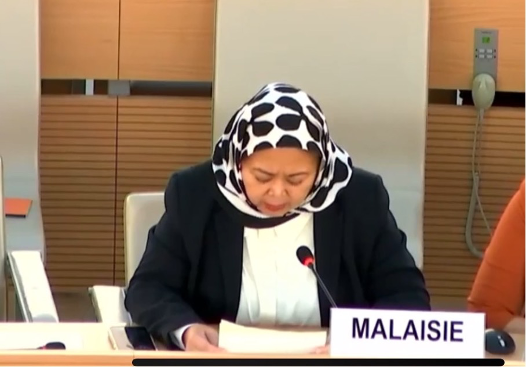 The delegation of Malaysia provided its point of view on the Special Rapporteur’s report regarding the case of Thuzar Maug, who was thought to have been kidnapped, whereas the Malaysian authorities determined otherwise. They considered that the information in the report was not completely accurate. Secondly, Malaysia echoed the stance of fellow ASEAN Member States and reiterated the call from the leaders that the ASEAN Five-Point Consensus should remain a primary framework for addressing the situation in Myanmar. They emphasised the necessity for a genuine commitment from the Myanmar military in implementing the Five-Point Consensus. Lastly, Malaysia remained dedicated to supporting efforts for the safe, voluntary, and dignified return of refugees and asylum seekers from Myanmar. They noted the importance of the cooperation of the international community in sharing the burden and responsibility through the resettlement of Myanmar refugees to third countries from Malaysia.
The delegation of Malaysia provided its point of view on the Special Rapporteur’s report regarding the case of Thuzar Maug, who was thought to have been kidnapped, whereas the Malaysian authorities determined otherwise. They considered that the information in the report was not completely accurate. Secondly, Malaysia echoed the stance of fellow ASEAN Member States and reiterated the call from the leaders that the ASEAN Five-Point Consensus should remain a primary framework for addressing the situation in Myanmar. They emphasised the necessity for a genuine commitment from the Myanmar military in implementing the Five-Point Consensus. Lastly, Malaysia remained dedicated to supporting efforts for the safe, voluntary, and dignified return of refugees and asylum seekers from Myanmar. They noted the importance of the cooperation of the international community in sharing the burden and responsibility through the resettlement of Myanmar refugees to third countries from Malaysia.
Non-Governmental Organisations Statements
The NGOs applauded the unwavering determination of the people of Myanmar to be free from the military regime and build a new democracy allowing justice and human rights. The unanimity of organisations welcomed the Special Rapporteur’s report emphasising the horror the people of Myanmar and the Rohingyas are currently living in. The NGOs collectively noted the repetitive and appalling character of the military's strategies, which involved indiscriminate, disproportionate, and deliberate assaults on civilians notably with the use of airstrikes.
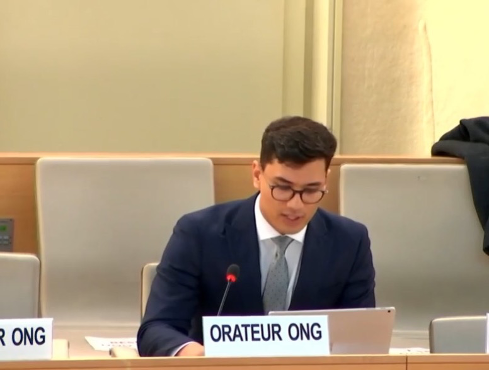 The Geneva International Centre for Justice (GICJ), called for a cut off of instruments used for the junta’s repression and urged the international community to provide more humanitarian funding to refugees, particularly in neighbouring Bangladesh. Lastly, the GICJ underscored the need for States to hold military leaders personally accountable for their genocidal acts, notably through mechanisms like the International Criminal Court.
The Geneva International Centre for Justice (GICJ), called for a cut off of instruments used for the junta’s repression and urged the international community to provide more humanitarian funding to refugees, particularly in neighbouring Bangladesh. Lastly, the GICJ underscored the need for States to hold military leaders personally accountable for their genocidal acts, notably through mechanisms like the International Criminal Court.
Moreover, it was underscored that for the Five-Point consensus to achieve legitimate peace, it needed to include the participation, and consent of the people of Myanmar while addressing the root cause of the crisis. A common plea from the NGOs was a call on the international community to take decisive action and put an end to human rights violations being committed, particularly against the Rohingya Muslim minorities in Myanmar. Their collective messages highlighted the urgent need for accountability and intervention from the international community and the UN.
Concluding observations
The forced recruitment of young people in Myanmar represents a desperate measure by the junta that suffered significant troop losses since the coup and is now intensifying its intimidation tactics. The Special Rapporteur called on Member States to welcome and support young people forced to flee after refusing to take part in the brutality of the military regime against their people.
Moreover, the Special Rapporteur’s report recalled the extreme importance for Member States, including ASEAN, to take any measures to end the violence and the killing of civilians and ensure accountability. Mr Andrews urged Member States to consider filing a referral to the International Criminal Court to investigate current violations under Article 14 of the Rome Statute. The National Unity Government of Myanmar accepted the Court’s jurisdiction over crimes committed since 2002, allowing opportunities to pursue effective accountability.
The Rohingyas are being attacked with no possibility for them to leave their villages and are being forced to join military forces and commit war crimes against their people. The Special Rapporteur also emphasised that the Rohingyas in Bangladesh’s camps are suffering and dying from malnutrition and ill-treatment. There is an urgent need to send humanitarian aid inside Myanmar, where the conflict is happening. He noted the significance of ensuring that women are not left behind, as their situation is worsening due to the crisis and the collapsed economy, inevitably resulting in domestic abuse, detention, sexual harassment, etc.
The Special Rapporteur continued his remarks by disagreeing with some statements, viewing the crisis in Myanmar as a simple internal matter. Indeed, this matter is impacting people in neighbouring countries and the region. For this reason, he called on the Security Council to take action, especially taking into account the increase of aerial attacks in Myanmar on civilians.
Finally, the Special Rapporteur concluded by calling for the Security Council to put forward a resolution and for Member States to disrupt the junta’s access to weapons, funding, and legitimacy, which are essential for their survival while ensuring widespread awareness of the impending accountability for their crimes.
Geneva International Centre for Justice (GICJ) Position
The Geneva International Centre for Justice (GICJ) strongly condemns the actions of the military junta in Myanmar and the ongoing human rights violations against the Rohingya people. GICJ emphasises the need for accountability for the atrocities committed by the military regime, including the violent crackdown on pro-democracy protesters and the displacement and persecution of the Rohingya minority. GICJ calls for international pressure to be exerted on the junta to halt the violence, restore democracy, and ensure the protection of human rights for all people in Myanmar, including the Rohingya community.
The organisation advocates for the prosecution of those responsible for crimes against humanity and urges the international community to provide support and assistance to those affected by the crisis.
During an oral statement at the 35th meeting of the 55th session, the GICJ called on the international community to take the following measures: “First, cut off the instruments of the junta’s repression. This includes cracking down on international arms dealers and networks, preventing the regime from accessing aircraft fuel that sustains its deadly airstrikes, and imposing additional sanctions on the country’s financial system. Second, the international community must provide more humanitarian funding to refugees, particularly in neighbouring Bangladesh, which hosts roughly one million Rohingyas who live under miserable conditions amid declining international aid. Lastly, States must hold military leaders personally accountable for their genocidal acts, notably through mechanisms like the International Criminal Court”.
#HRC55 #Myanmar #SpecialRapporteur #Genocide #CrimesAgainstHumanity #RohingyaMinorities #RohingyaMuslims #HumanRights #Justice #GICJ #Geneva4Justice #GenevaInternationalCentreforJustice




